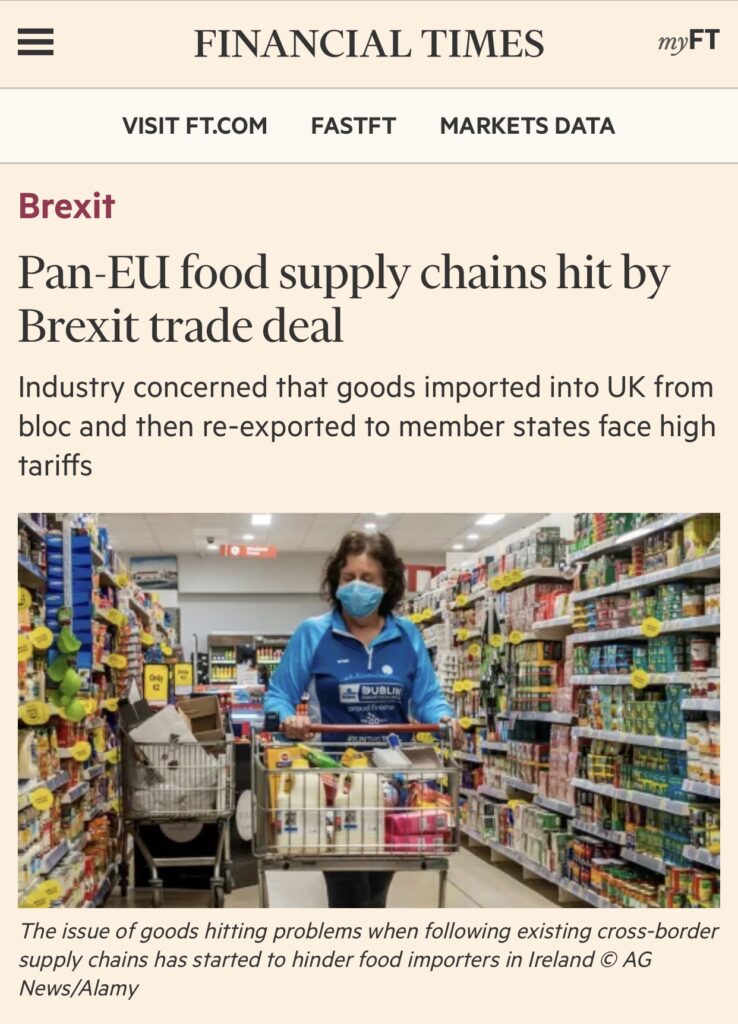FT: Pan-EU food supply chains hit by Brexit trade deal
The food and drink industry has raised serious concerns about the new EU-UK trade deal because businesses face punitive tariffs on goods from the bloc processed at British distribution hubs that are re-exported to member states.
HMG has responded to the article by referring to use of other procedures, like transit. This is correct and can help some of these flows, however not all. It depends on how the industry has organized the spcific value chains and the supply chain. Secondly, unfortunately there are not enough simplifications available for the transit procedure since HMG for various reasons has been slow approving ’authorised consignee/consignor” permits. This means that transit movements need to start and end at customs offices instead of at the premises of approved companies (my comment)..

Industry bodies on both sides of the Channel have warned that the so-called “rules of origin” chapter of the deal effectively blocks existing supply chains, and have urgently raised the issue with both the UK government and the European Commission.
Dominic Goudie, the head of international trade for the UK’s Food and Drink Federation, said the group was “very concerned about the implications of rules of origin for food and drink suppliers in both the EU and UK”.
“Goods shipped to distribution hubs in Great Britain face the payment of full EU tariffs when they return to the EU and as a result, suppliers are being forced to cancel the delivery of products to customers in Ireland,” he said.
But an EU official warned that some businesses would have to adapt their operations given the new regime. “You can’t expect Brexit not to have consequences,” said the official. “The UK won’t be a distribution hub for the EU any more. EU businesses will need to stop relying on UK hubs.”
A person familiar with internal Whitehall discussions said that Defra, the UK’s food and agriculture ministry, had confirmed assessments given in legal advice to industry on the issue.
UK industry concerns have been echoed in the EU. One major producer, who asked not to be named, said that the issue affected 25 to 30 of its trucks a week containing EU-finished goods that had been split at a GB warehouse en route to Dublin.
Muriel Korter, the director-general of the EU’s association of chocolate, biscuits and confectionery (Caobisco) said it had contacted the EU authorities to seek an “immediate solution” to the issue.
“Our EU-UK supply chains are so interdependent . . . especially businesses that have factories across the Channel and use the facilities to store goods and re-ship them,” she added.
The problem has started to hinder food importers in Ireland. “Companies are beginning to raise this across the industry,” said Paul Kelly, director of Food Drink Ireland, the main lobby group for the sector. “There’s still a lot of clarity that needs to be brought to the issue so people can make any necessary changes to their supply chain.”
Trade experts said the problem had arisen because the basic, Canada-style trade deal sought by the UK did not take into account the integration of supply chains and close proximity of the UK to the EU.
Under the terms of the UK-EU Trade and Co-operation Agreement, goods must “originate” in the EU or the UK in order to qualify for zero tariff treatment.
Source: FT
You must be logged in to post a comment.